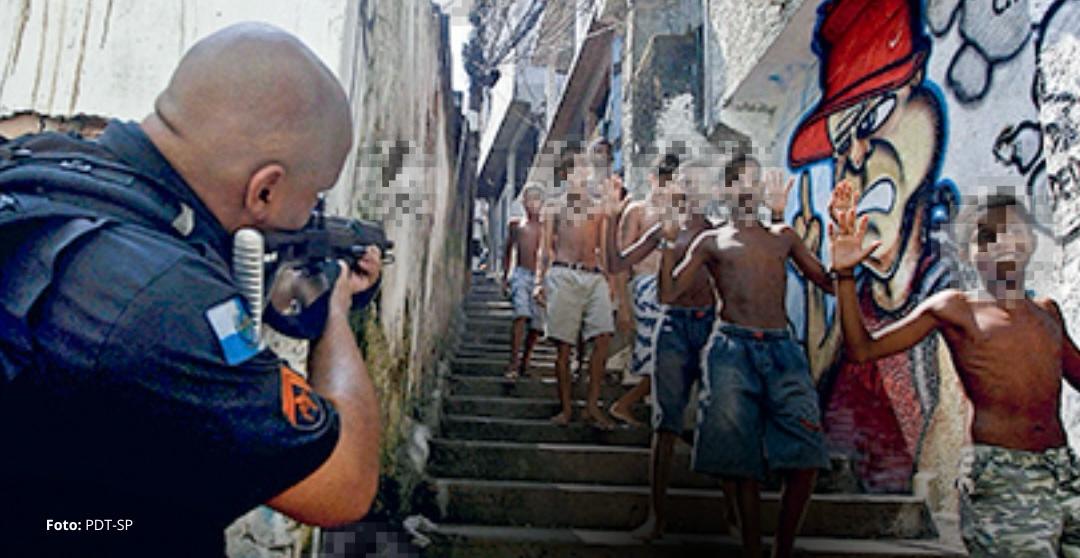Brazil, December 5, 2024 – Brazil is rapidly moving in the wrong direction concerning respect for human rights, particularly regarding structural and systemic racism, a result of continuous policies that highlight violations and disregard for the lives of Black people. Violence as a public security policy is most evident among residents on the outskirts of major urban centers. In 2024 alone, instances of abusive police violence have risen exponentially. Considering this scenario, the Institute on Race, Equality, and Human Rights (Race and Equality) calls for objective and direct action by the Brazilian State in managing São Paulo’s public security. A rights-based security policy is urgently needed to hold the state security apparatus accountable for its authoritarianism and negligence.
According to the São Paulo State Prosecutor’s Office, São Paulo State saw a 46% increase in deaths caused by police officers. From January to November 2024, there were 673 fatalities at the hands of São Paulo police, averaging two victims per day.
Recent events demonstrate a lack of control and management of public security policy in São Paulo State. Various cases, some witnessed by citizens and even recorded on police body cameras, reveal excessive violence, even when suspects are subdued. The brutal actions of the Military Police range from headshots, executions from behind, point-blank executions, the death of a child in an alleged shootout, various physical assaults, a person being apprehended by 13 officers, and an officer throwing a victim’s body off a bridge in São Paulo’s southern zone, among others. These incidents raise the question: is there any effective control over the military police, or has the state government given them a free pass to commit violations?
Moreover, the creation of a Parallel Ombudsman Office by the Secretary of Public Security, Guilherme Derrite, is yet another indication that São Paulo’s police forces will continue escalating violence with impunity. This is especially concerning, given that there is already a Civil Police Ombudsman Office, which has tirelessly denounced São Paulo State’s public security policy. According to the São Paulo Bar Association (OAB-SP), the creation of a parallel ombudsman office, lacking any autonomy, further undermines mechanisms for police accountability and transparency.
“It is evident that public security policy in São Paulo State contradicts numerous United Nations reports, which stress the need for monitoring procedures and an effective, non-corporatist internal affairs department. Additionally, investigations must proceed swiftly to restore some credibility to the Military Police and the São Paulo State government,” said Rodnei Jericó, Race and Equality Director in Brazil.
After she visited Brazil in August 2024, the UN Special Rapporteur on contemporary forms of racism, racial discrimination, xenophobia and related intolerance, Ashiwini K.P., published a report on racial issues in the country, highlighting the severity and complexity of violence by public security forces. The report urges the State to take more effective measures regarding the prison system. While acknowledging that the use of police body cameras is an important step toward anti-racist security policies, the report notes that these cameras are reportedly not being utilized, and racial profiling measures are being implemented without a scientific basis. Furthermore, the Special Rapporteur pointed out that Afro-descendant mothers who lose their children due to police brutality are often criminalized, in addition to being victims themselves.
In October 2024, the UN’s International Independent Expert Mechanism to Advance Racial Equality and Justice in Law Enforcement (EMLER) released a report highlighting systemic racism entrenched in the police force and the criminal justice system. Racial prejudice, profiling, and stereotypes influence the State’s actions and inactions. The excessive use of public security force results in thousands of deaths annually and disproportionate incarceration rates for Black people. These outcomes are a consequence of systemic racism combined with current “war on crime” policies, effectively leading to social cleansing by targeting sectors of society deemed undesirable, dangerous, or criminal. This widespread systemic issue requires a systemic and comprehensive response.
Among the various recommendations issued by EMLER, the following are critical in combating police violence linked to racial profiling:
- Establishing a national civilian oversight body for the police.
- Making the use of police body cameras mandatory nationwide.
- Adopting a human rights-based approach to policing.
- Ending current “war on drugs” and “war on crime” policies and replacing them with human rights-based approaches.
- Enacting national legislation on the use of force aligned with international human rights standards—particularly the principles of legality, precaution, necessity, proportionality, accountability, non-discrimination, and the obligation to protect and respect the right to life.
- Ensuring racial profiling is clearly defined and prohibited by law, investigating all allegations of racial profiling, and prosecuting cases accordingly.
- Holding all law enforcement personnel accountable for excessive force and other human rights violations, including commanding officers and agencies as institutions, not just individual officers directly involved.
- Ensuring victims’ right to reparations, notably by legally establishing an independent, victim-centered mechanism with sufficient funding, specifically designed to support affected individuals and communities.


